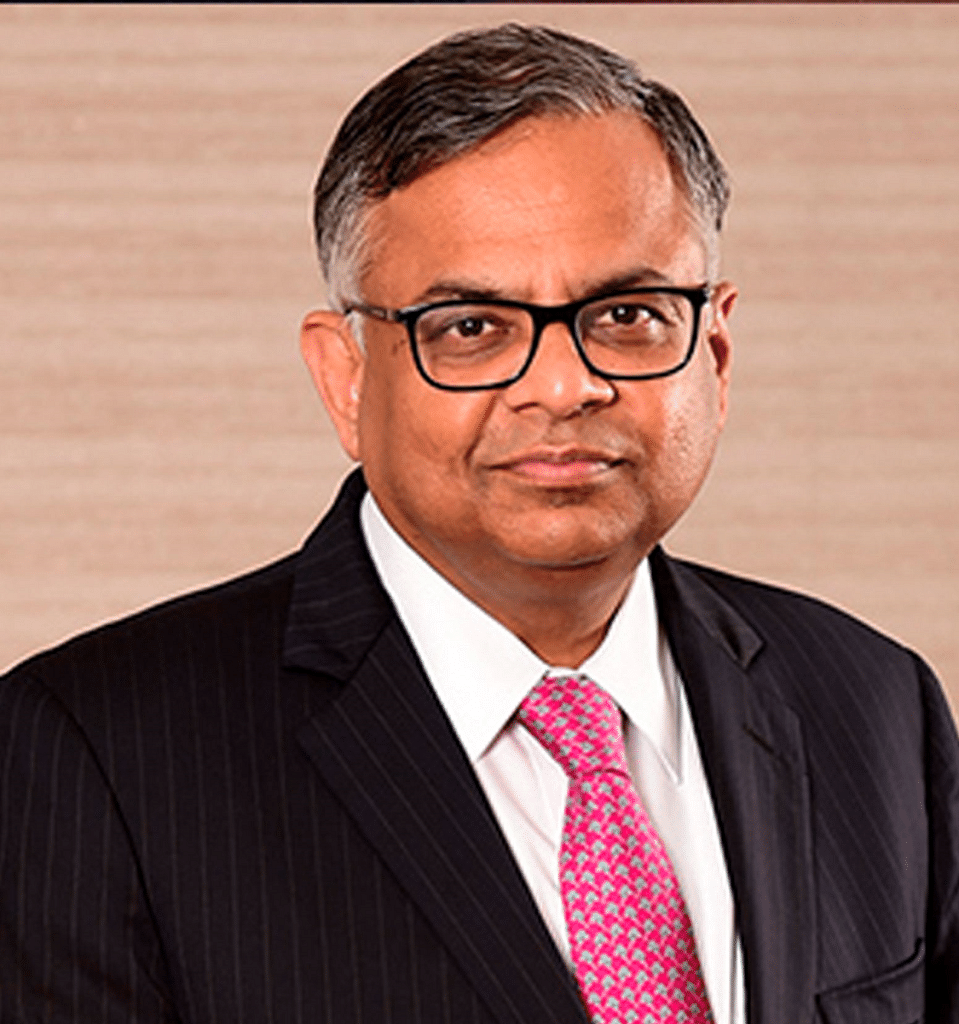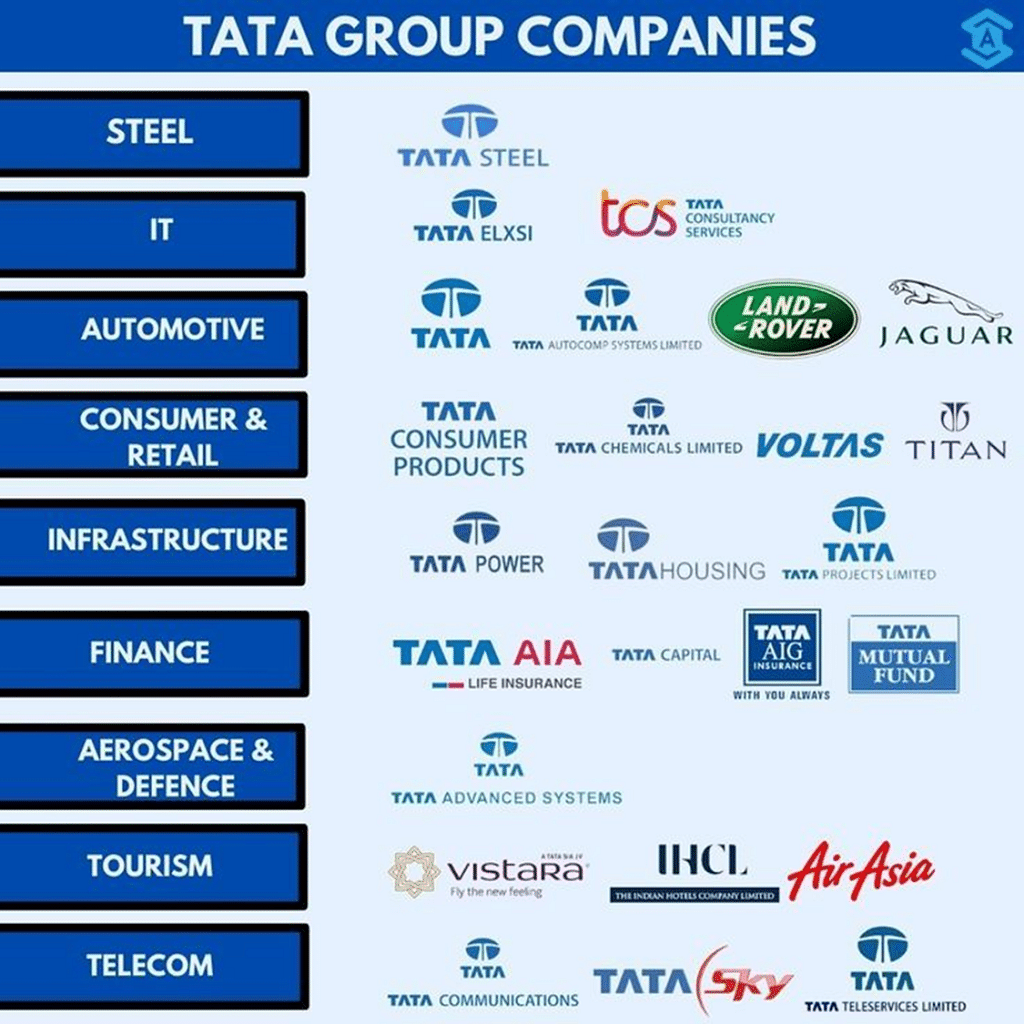From Steel to Software: The Diverse Portfolio of Tata Group

Established by Jamsetji Tata in 1868, the Tata Group is a global enterprise based in India, consisting of 30 companies across ten sectors. The group operates in over 100 countries across six continents, guided by the mission "To enhance the quality of life for the communities we serve worldwide through sustainable stakeholder value creation grounded in Leadership with Trust." The Tata Group is one of India's largest and oldest conglomerates, with a rich history and diverse portfolio. Below is a detailed timeline of the Tata Group's history, key members, statistical data, diversification, and portfolio.
Timeline of the Tata Group
| Year | Event |
| 1868 | Jamsetji Tata founded the Tata Group in Mumbai, initially starting with a trading company |
| 1874 | Established the first cotton mill in Nagpur, named the Central India Spinning, Weaving and Manufacturing Company |
| 1901 | Jamsetji Tata passed away; his vision for steel, hydroelectricity, and education lived on |
| 1907 | Tata Steel (then Tata Iron and Steel Company) was founded in Jamshedpur |
| 1932 | Tata Airlines, which later became Air India, was established |
| 1945 | Tata Engineering and Locomotive Co. Ltd. (TELCO) was founded |
| 1962 | Tata Consultancy Services (TCS) was established, marking the group's entry into IT |
| 1991 | Liberalization of the Indian economy; Tata Group diversified further into new sectors |
| 2000 | TCS was listed on the Indian stock market |
| 2008 | Tata Nano was launched, aiming to provide an affordable car for the masses |
| 2017 | Natarajan Chandrasekaran appointed as Chairman of Tata Sons |
| 2021 | Tata Group acquired Air India, returning it to Indian ownership |
| 2023 | Tata Group announced ambitious plans for electric vehicle manufacturing |
Key Members of the Tata Group
The Tata Group's success is attributed to several influential leaders who shaped its vision and direction:
- Jamsetji Tata (1839-1904)

Role: Founder of the Tata Group
Contributions: Established the first Tata company in 1868 and laid the groundwork for industries like steel (Tata Steel) and hydroelectric power (Tata Power). He emphasized social responsibility, founding institutions such as the Indian Institute of Science.
- J.R.D. Tata (1904-1993)

Role: Chairman (1938-1991)
Contributions: Expanded the group into aviation (Tata Airlines), hospitality (Taj Hotels), and engineering. He was a pioneer of corporate ethics and emphasized corporate social responsibility, influencing Tata’s community-focused initiatives.
- Ratan Tata (1937-2024)

Role: Chairman (1991-2012)
Contributions: Transformed Tata into a global powerhouse through acquisitions like Jaguar Land Rover and the launch of the Tata Nano. He is known for his commitment to philanthropy, directing significant resources to social causes.
- Natarajan Chandrasekaran (1963-Present)

Role: Chairman (2017-Present)
Contributions: Focused on digital transformation and sustainability, steering the group towards innovation, especially in technology and electric vehicles. He fosters leadership development within the organization.
- Noel Tata (1962-Present)

Role: Managing Director of Tata International
Contributions: Played a key role in expanding Tata’s retail strategy with brands like Westside, focusing on international trade and business growth.
Statistical Data of the Tata Group
The Tata Group has demonstrated significant growth and diversification over its long history. Here’s an in-depth look at key statistical data that highlights its financial performance, workforce, and market presence.
1. Revenue Growth
- 1991: Approximately $5 billion in revenue.
- 2001: Revenue reached around $15 billion.
- 2011: Revenue climbed to about $67 billion.
- 2023: The group's revenue surpassed $113 billion.
This trajectory reflects robust growth, particularly following India's economic liberalization in the early 1990s, which allowed Tata to expand aggressively into global markets.
2. Market Capitalization
- 2023: The combined market capitalization of Tata Group companies exceeded $200 billion. This places it among the top corporate entities in India, showcasing its strong investor confidence and market performance.
3. Global Presence
- Countries: Tata Group operates in over 100 countries across six continents.
- Companies: The group comprises more than 100 subsidiaries, each contributing to a diverse portfolio.
4. Workforce
- Employees: The Tata Group employs around 924,000 people globally. This extensive workforce spans various sectors, from manufacturing to IT services and hospitality.
5. Sector Contributions
- Tata Steel: One of the top steel producers globally, contributing significantly to the group's revenue.
- Tata Motors: A major player in the automotive industry, known for both passenger vehicles and commercial vehicles.
- TCS (Tata Consultancy Services): The largest IT services company in India, contributing about $25 billion in revenue alone as of 2023.
6. Investments in Innovation and Sustainability
- R&D Spending: Tata Group invests heavily in research and development, with significant allocations towards innovation in electric vehicles and sustainable technologies.
- Sustainability Goals: The group aims to achieve net-zero emissions by 2030, reflecting its commitment to environmental responsibility.
7. Philanthropy
- Philanthropic Contributions: Approximately 66% of the Tata Group’s equity is held by philanthropic trusts, illustrating a strong commitment to social causes. The group invests significantly in education, healthcare, and rural development initiatives.
Diversification of the Tata Group
The Tata Group has diversified into various sectors over the decades, making it one of the most versatile conglomerates in the world. Below are some of the key sectors in which Tata operates:

1. Steel: Tata Steel is one of the top steel producers globally.
2. Automotive: Tata Motors is known for manufacturing cars, trucks, and electric vehicles.
3. IT Services: Tata Consultancy Services is a leading IT services provider worldwide.
4. Consumer Products: Tata Consumer Products includes brands like Tata Tea and Tata Coffee.
5. Telecommunications: Tata Communications provides a range of telecom services.
6. Hospitality: Tata Group owns the Taj Hotels chain, renowned for luxury hospitality.
7. Infrastructure: Tata Projects is involved in various infrastructure development projects.
Tata Group Portfolio
The Tata Group operates in more than 100 countries across six continents, and its portfolio includes some of the most recognizable brands. Here’s a snapshot of its major companies:

| Sector | Company Name | Notable Brands / Products |
| Steel | Tata Steel | Tata Tiscon, Tata Steel Long Products |
| Automotive | Tata Motors | Tata Nexon, Tata Safari |
| IT Services | Tata Consultancy Services (TCS) | IT Consulting, Software Services |
| Consumer Products | Tata Consumer Products | Tata Tea, Tata Salt |
| Telecommunications | Tata Communications | Tata Tele, VSNL |
| Hospitality | Indian Hotels Company (Taj Hotels) | Taj Hotels, Ginger Hotels |
| Infrastructure | Tata Projects | Infrastructure Development |
| Chemicals | Tata Chemicals | Tata Salt, Tata Chemicals Fertilisers |
| Retail | Trent (Westside, Star Bazaar) | Retail Outlets |
The Tata Group has evolved remarkably since its inception in 1868. Through visionary leadership, strategic diversification, and a commitment to quality and social responsibility, it has established itself as a cornerstone of the Indian economy and a global player. With continued emphasis on innovation and sustainability, the Tata Group is well-positioned to face future challenges and seize new opportunities in an ever-changing global landscape.
Latest Industry Insights News
View all Industry Insights NewsPopular Truck Brands
Popular Buses Brands
Popular Three Wheelers Brands
- Altigreen
- Euler Motors
- Mahindra
- Piaggio
- Bajaj
- Greaves Mobility
- ATUL
- TVS
- Omega Seiki Mobility
- Kinetic
- Lohia
- JSA
- YC Electric
- Udaan
- SN Solar Energy
- Saarthi
- Teja (Powered by Greaves)
- Jezza Motors
- GreenRick
- City Life Electric
- Ampere
- Baba Electric
- E-Ashwa
- Bahubali E Rickshaw
- Dabang
- Deltic
- Keto Motors
- Mini Metro
- Gayam Motors
- Gem EV
- Gkon Automotive
- Skyride
- Thukral Electric
- Baxy
- Eblu
- Hexall
- Joy
- Montra
- Star
- Dandera